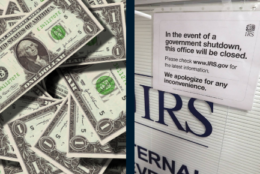Federal Report
-
If Uncle Sam kept a list of endangered workers, folks under the old Civil Service Retirement System would be at the top. Less than six of every 100 workers still on the payroll are under the system that was phased out in the mid 1980s.
February 21, 2019 -
Folks under the old Civil Service Retirement System, like people who get Social Security benefits, are protected from inflation. But most people on the federal pay roll are under FERS.
February 21, 2019 -
Allan Roth, founder of Wealth Logic and a nationally syndicated financial columnist, said that when it comes to investing, his motto is "Dare to be dull," as in boring.
February 20, 2019 -
The timing of the third shutdown of 2018 and the implementation of 2017 tax reform created major paycheck and cash flow problems for tens of thousands around the nation.
February 18, 2019 -
This is one of those federal holidays that a lot of people don't get. It’s a combined celebration for two of our greatest president.
February 18, 2019 -
Is life as a civil servant, a steady rewarding job with the opportunity to help others, what you had hoped an expected? If you could, would you do it again or would you choose another, less stressful career?
February 15, 2019 -
We’ll know soon enough about the latest shutdown, but the pay raise is a little more complicated. H.R. 790 passed the House easily but has remained stagnant in the Senate since Jan. 31.
February 14, 2019 -
This week's Your Turn guest is estate attorney Tom O’Rourke, a former IRS attorney who now works exclusively on things such as wills, powers-of-attorney, medical directives and trusts, which some would say most people should have.
February 13, 2019 -
Senior Correspondent Mike Causey recently received an email from a listener with $1.2 million in the Thrift Savings Plan and made on his second move of funds last September.
February 12, 2019 -
Federal agencies are reportedly suffering glitches to get back pay to essential and furloughed employees from the recent partial government shutdown.
February 11, 2019 -
The typical federal worker has been through at least four shutdowns. Another may happen as soon as this month, so we asked a long-time U.S. Postal Service worker in Florida and financial coach, to dig into his memory bank.
February 08, 2019 -
Imagine asking for a $100 grant or gift from a charity because you desperately need it to fill the tank with gas so you could get to a job where you were not getting paid?
February 07, 2019 -
For the past decade the number of self-made millionaires in the federal Thrift Savings Plan has been growing steadily. peaking in September. But the last quarter of 2018 saw the market fall.
February 05, 2019 -
Either House Democrats will cave on the southern border wall, President Donald Trump has learned his lesson or he’ll call a national emergency to get it built.
February 04, 2019 -
People expect the government in Washington to panic over ice and snow. For as long as anyone can remember folks at the headquarters office of most federal operations pack the traditional D.C. survival kit: White bread, milk and toilet paper.
February 01, 2019















